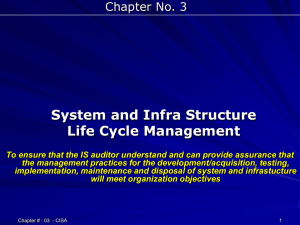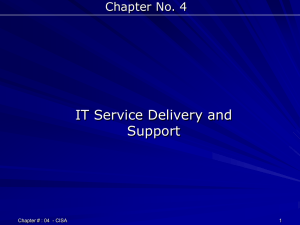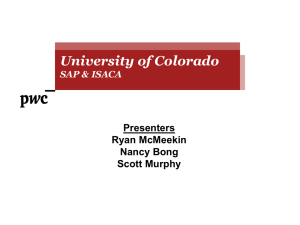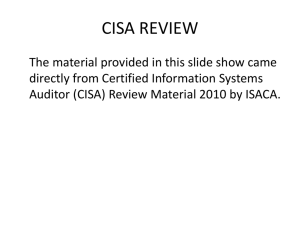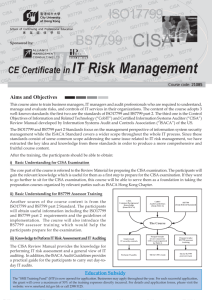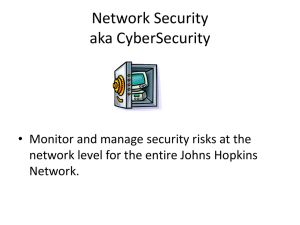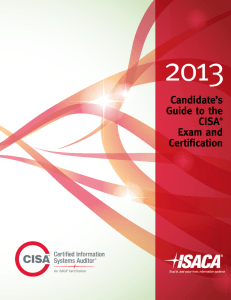5th Chapter - information systems and it audit
advertisement
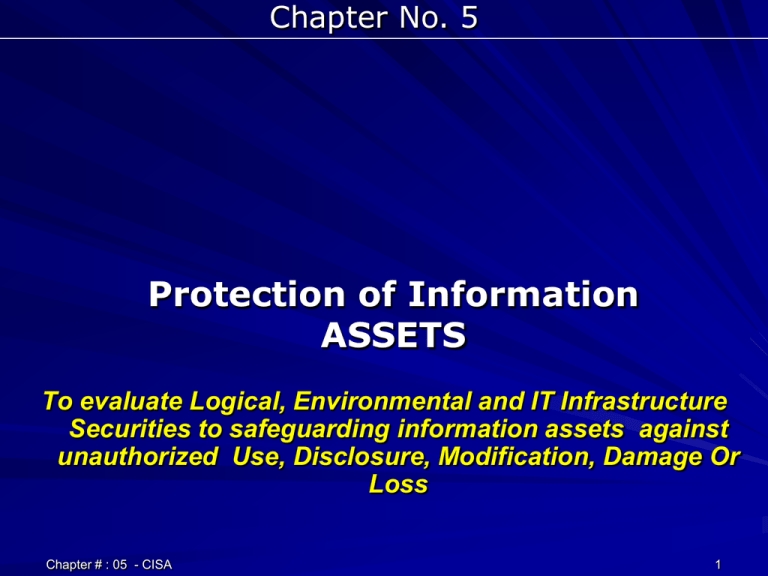
Chapter No. 5 Protection of Information ASSETS To evaluate Logical, Environmental and IT Infrastructure Securities to safeguarding information assets against unauthorized Use, Disclosure, Modification, Damage Or Loss Chapter # : 05 - CISA 1 LOGICAL ACCESS EXPOSURES : • Logical Access Exposures • Trojan Horses • Rounding Down • Salami Techniques • Virus • Worms • Logic Bombs • Trap Doors • Asynchronous Attacks • Data Leakage • Wire-Tapping • Piggybacking • Computer Shutdown • Daniel of Services Chapter # : 05 - CISA 2 LOGICAL ACCESS EXPOSURES : • Logical Access Control Software : To prevent unauthorized access and modification to sensitive data and critical functions. It should be applied to networks, operating systems, databases and application systems • • • • • • • • • General OS Access Control Functions: Apply user ID and authentication Logon on specific terminal Multi-level access Individual accountability and auditability Create or change user profiles Log Events Log User Activities Report capabilities Chapter # : 05 - CISA 3 LOGICAL ACCESS EXPOSURES : • Identification and Authentications : Based on, something You Know, something You have and something You Are – Logon-IDs and Passwords Something you know – Token Devices, One Time Access Control Something you have – Biometrics Security Access Control (through Finger Prints, Eye Retina) Something you are Chapter # : 05 - CISA 4 LOGICAL ACCESS EXPOSURES : I&A • Features of Passwords : • It should be easy to remember for user but • Difficult for perpetrator to guess • Initial Password should be changed on first time log-on • In result of entering wrong password ID should be held • Re-activation of ID should be on written request/approval by security administrator. • Password encryption and should be shadowed • Changed periodically • Must be unique to each user ID. • Unused IDs should be deactivated and logged off • Ideally length of Password is 5 to 8 characters • Usage of Alphabets, Numeric, Lower case and special Chapter # : 05 - CISA 5 LOGICAL ACCESS EXPOSURES : I&A • Token Devices, Once-Time Passwords • Biometrics : • Palm : ridges, valleys etc • Hand Geometry : 3 dim perspective of hand • Iris : Eyes colored portion surrounded • Retina • Finger Prints • Face • Signatures • Voice Recognition Chapter # : 05 - CISA 6 LOGICAL ACCESS EXPOSURES : I&A • Single Sign-on (SSO) • Advantages : • No need to remember multiple PWDs • Improves administrators ability to manage user profiles • Reduces Administrative overheads • Reduces the time taken by user • Disadvantages : • Support for all major OS is difficult • Significant cost associated with SSO development • Single point of failure and total compromise of an organization’s IS assets Chapter # : 05 - CISA 7 NETWORK INFRASTRUCTURE SECURITY : • Controls • Technical Qualified Operators, • Job rotation (wherever possible) • Restricted operation of operators over operator activity logs etc. • Audit trail of all operator activities and its periodical review by operations management. • Availability of documented Network operations standards and protocols to operators and periodical review to ensure compliance. • Analysis for workload balance, fast response time and system efficiency • Encryption should be used wherever required Chapter # : 05 - CISA 8 NETWORK INFRASTRUCTURE SECURITY : • LAN Security – Threats : Loss of Data & Programs, less version control, Exposure to external Activities, viruses, Improper disclosure of data, Violating Software License, Illegal access by impersonating or masquerading, Internal user's Spoofing – Remedies : Declaring ownership of programs, files and storage, Limiting access to read only, Record and File locking, enforcing ID/Passwords procedures. – Dial Up Control : Encrypted Passwords, Dialback modems for verification Chapter # : 05 - CISA 9 NETWORK INFRASTRUCTURE SECURITY : • Client Server Security : – Disabling the floppy drives – Network Monitoring devices to inspect activities – Data Encryption – Application level Access control programs Chapter # : 05 - CISA 10 NETWORK INFRASTRUCTURE SECURITY : • Internet Threats : – – – – – Disclosure Masquerade or Spoofing (Disguise IP address etc) Unauthorized access Loss of Integrity Denial of service (Sys Flooding of messages / requests and keep machines busy) – Theft of service and resources • Internet Security Controls: – – – – – – – Risk assessment of web based application. Security awareness Firewall standards Intrusion Detection standards security Remote Access for coordinating and controlling centrally Encryption techniques Monitoring usage of unauthorized usage and notification to them. Chapter # : 05 - CISA 11 NETWORK INFRASTRUCTURE SECURITY : • Firewall Security Systems : • General Features • Firewall Types Router Packet Filtering Application firewall Stateful inspection • Firewall Issues • Creates false sense of security • Other entry points, connections direct though Modems • Mis-configuration • Firewall without screening router is useless • Irregular monitoring of activities • Irregular maintenance of Firewall policies Chapter # : 05 - CISA 12 NETWORK INFRASTRUCTURE SECURITY : • Intrusion Detection Systems (IDS) : • Components of IDS Sensor, Analyzer, An administrator Console A user interface • Features Intrusion Detection Gathering Evidence Automated response Security Policy Interface with system tools Security Policy management • Limitations Weaknesses in the policy definition Application level vulnerabilities Backdoors into application Weakness in identification and authentication schemes • Honeypots and Honeynets Software application pretend to be unfortunately hacked Network of honeypots making a false network for hackers to hack and caught Chapter # : 05 - CISA 13 NETWORK INFRASTRUCTURE SECURITY : • Encryption: • Is a process of converting a plaintext into a secure coded form of text (Cipher General Features) • Key Elements of Encryption Systems Encryption Algorithm Encryption Keys Key Length • • • • Private Key Cryptographic system Public Key Cryptographic System Digital Signatures Digital Envalop • Is used to send encrypted information and relevant keys along with it. Chapter # : 05 - CISA 14 AUDITING NETWORK INFRASTRUCTURE SECURITY : Review network Diagram Identify Network Design Dissemination of policies and standards Experience/knowledge of security operators for internet legislative issues are considered against usage of internet based application Review of service level contract in case of outsourcing. Hardware and software are well upgraded to counter new vulnerabilities – – – – – – – – Auditing Remote Access Auditing internet “point of presence” Network penetration tests Full network assessment reviews LAN network assessment Development and Authorization of network change Unauthorized changes Computer forensics Chapter # : 05 - CISA 15 ENVIRONMENTAL EXPOSURES AND CONTORLS: • Environmental Issues and Exposures : – Fire, Natural Disasters, – Power Failure Total Failure Severely reduced voltage Sages, spikes and surges Electromagnetic interference – Power Spike – Air conditioning Failure – Electric Shock – Equipment Failure – Water Damage / Flooding – Bomb Threat/attack Chapter # : 05 - CISA 16 ENVIRONMENTAL EXPOSURES AND CONTORLS: Controls for Environmental exposures : – – – – – – Alarm Control Panel Water Detectors Handheld Fire Extinguishers Manual Fire alarms Smoke detectors Fire Suppression System Water-based, Halon system, FM-200, CO2 system – – – – – – – – – Logically Locating the Computer Room Regular Inspection by Fire Department Fire Proof Walls Floors and Ceilings surrounding the computer room Electrical surge Protector UPS / Generators Emergency Power Off Switch Power leads from two substations Wiring in electrical panels and conduit Prohibiting against eating, drinking and smoking within the information processing facility – Fire resistant office material – Documented and tested emergency Evacuation Plans. Chapter # : 05 - CISA 17 ENVIRONMENTAL EXPOSURES AND CONTORLS: Auditing Environmental Controls : – Auditing of all above listed controls Chapter # : 05 - CISA 18
